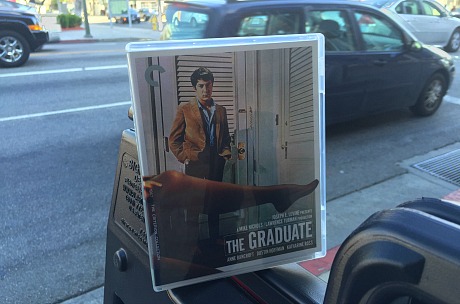Criterion’s Bluray of Mike Nichols‘ The Graduate popped yesterday. I’ve seen it a thousand times and I already own the MGM Bluray that came out in 2011, but I bought the damn Criterion anyway because of the Howard Suber commentary track, which is one of the best I’ve ever heard on any Bluray or DVD of any film. Seriously — it’s really worth watching this film with Suber on the couch, chatting away. Just do it and you’ll thank me.

Taken today at northwest corner of Sunset and Cahuenga, just after buying the Criterion Graduate Bluray at Amoeba across the street.
“Yes, Suber’s commentary is an academic analysis, a bit dry and professorial, a formal instruction,” I wrote two or three years ago, “but it’s very wise and knowledgable, and ripe with all kinds of allusions, insights, asides and connections. Suber gently explains how there’s a lot more to this 1967 classic than just story, dialogue and performances. It’s really quite the integrated audio-visual tour de force.”
From Frank Rich’s essay in the Criterion liner notes: “The major studios all turned down The Graduate. The film was financed instead by an independent producer, Joseph Levine, who grew impatient as the shooting ran over schedule, into a fourth month. Levine exhibited scant optimism about the movie’s prospects, and some of the most influential critics, including Pauline Kael and John Simon, dismissed it, as later would a writer at the New Yorker, Jacob Brackman, whose screed went on for some twenty pages.
“But prodded by some favorable reviews and word of mouth, audiences embraced The Graduate wholeheartedly, particularly the huge boomer audience that had started to wield its enormous box-office clout.
“This was the second time in 1967 that an iconoclastic American movie tapping into the incipient late-sixties mood had overridden some critical-establishment disdain to win large young audiences and Oscar nominations. The first was Bonnie and Clyde, whose director, Arthur Penn, and screenwriters, David Newman and Robert Benton, were openly inspired by France’s New Wave cinema; it would be hard to imagine their neo–gangster movie without antecedents like Jean-Luc Godard’s Breathless.”
Back to my piece: “For one thing Suber points out the highly significant contributions of The Graduate‘s production designer Richard Sylbert with the black-and-white wardrobes and interior designs, and how the leopard-skin prints suggest the jungle domain and primal instincts contained in a certain predator played by Anne Bancroft.
“As with Some Like It Hot, Suber also mentions his belief in the journey of most lead protagonists in most good comedies — desire, deception and discovery. The discovery phase, mind, is not just about the main character realizing what he/she truly wants but who he/she really is in the eyes of others. It happens when Dustin Hoffman‘s Benjamin Braddock, after an hour of uncertain, anxious behavior, finally stops reacting and makes a decisive move on his own. Suber calls it the ‘one-hour pivot point.'”
Over the years I’ve occasionally mentioned Suber’s Three Ds to filmmakers in interviews or party chit-chat. Each and every time they’ve said, “What are the Three Ds?”









